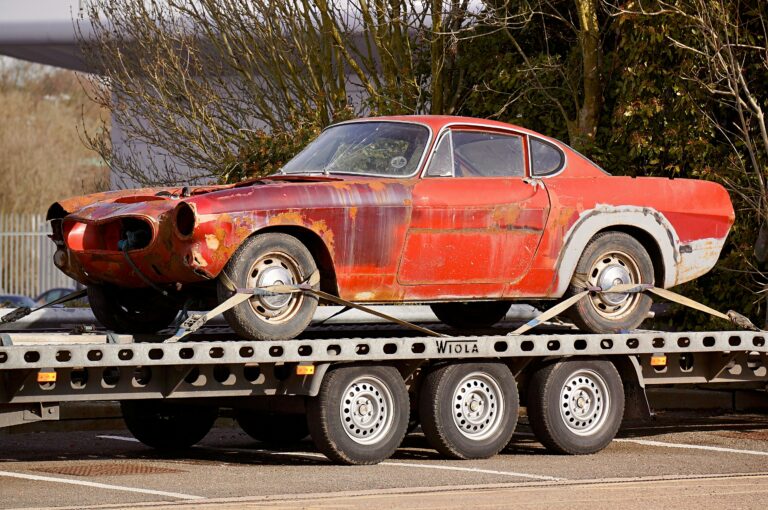
Who Pays for Car Damage in a No-Fault State? Demystifying Insurance Claims
What happens when you’re involved in a car accident in a no-fault state? In states with traditional insurance laws, the insurance provider of the driver at fault for the accident will cover any claims. There are first-party claims when your insurance provider pays out, and third-party ones when someone else is at fault for the accident.
Table of Contents
So, who pays for car damage in a no-fault state? We explain exactly what happens in this situation, so you can understand the process that follows.
What Is A No-Fault State?
No-fault auto insurance exists to cover individuals when there’s a car accident, regardless of who was at fault. As of right now, there are 12 no-fault states in the US. These states are:
- Florida
- Hawaii
- Kansas
- Kentucky
- Massachusetts
- Michigan
- Minnesota
- New Jersey
- New York
- North Dakota
- Pennsylvania
- Utah
If you live in any of these states, the no-fault law will apply. It effectively means that your insurance provider is charged with covering you if there’s an auto accident – regardless of who was at fault. So, whether you caused an accident or someone else did, you’ll make claims through your provider.
What Does No-Fault Insurance Cover?
It’s all well and good saying that no-fault states provide protection through your insurance provider, but what type of coverage do you receive?
No-fault insurance is a specific type of auto insurance that’s commonly known as personal injury protection (PIP). This provides you with insurance coverage for the following things:
- Any healthcare or medical expenses incurred following an auto accident
- Medical expenses for passengers as well as you (the policyholder)
- Loss of income
- Funeral costs
In essence, it mainly offers cover relating to your health and physical state after an accident. The key is that it won’t matter who was at fault for the accident – you could obtain an injury after causing an auto accident, but the no-fault state laws mean your insurance provider still has to foot the bill for any of the above expenses.
Who Pays For Car Damage In A No-Fault State?
As you may have clocked, no-fault insurance doesn’t cover car damage. This means that any repairs to your car will not automatically be covered by your insurance provider. They are only required to offer personal injury protection for bodily injuries – so who pays for car damage in a no-fault state?
Depending on the scenario, your insurance provider, a third-party insurance provider, or your bank balance will pay for car damage in a no-fault state.
It’s all based on the type of accident, damage sustained, and who is ultimately at fault for the incident. If you are at fault, your insurance provider may pay for car damage. If another person was at fault, you can try to get their insurance provider to pay for repairs.
When Will My Insurance Provider Pay For Car Damage In A No-Fault State?
You will already have no-fault personal injury protection coverage, but your insurance policy may also offer the following:
- Comprehensive Coverage – This offers coverage for all damages that happen to your vehicle outside of direct collisions or accidents. For example, if someone tries to break into your car or decides to attack it with a baseball bat, comprehensive coverage can be used to pay for repairs.
- Collision Coverage – This is the most common type of coverage that most policies will include as a standard add-on. It covers the cost of any damages sustained via collisions. This includes being hit by another car or if you hit an object.
You must know the difference between comprehensive and collision coverage as it impacts what you can claim. For instance, if you only have collision coverage and your car was damaged via theft, your insurance provider may not be able to pay out.
We should also note that you’re not obliged to obtain either type of auto insurance coverage. If you don’t have them, then the next option is to try and make a third-party insurance claim. However, this will only work in situations when there’s another party involved.
When Will Third-Party Insurance Pay For Car Damage In A No-Fault State?
Generally speaking, if you weren’t at fault for an accident involving another driver, you can make a third-party insurance claim. Here, you will contact the third-party insurance agency and report the incident, stating that you’d like to make a claim as they were at fault.
The third party will have liability coverage as a standard part of their auto insurance policy. It is a legal requirement in most states and protects drivers during accidents. This will mean the at-fault driver can use their insurance provider to pay for any car or property damages in a no-fault state.
As long as you can prove that they were at fault, the third-party insurance provider will cover the car damage costs for you. It sounds simple, but it is far from it. The insurance company will do everything in its power to try and dispute your claim. They’ll try to make it seem like you were at fault or that both parties share responsibility for the accident. If there’s not enough evidence in your corner, you can easily have a claim denied.
That’s why it’s important to stick around after an accident, so you can get as much information as possible. Take photos of the incident, write down contact details of any witnesses that can back up your story, file a police report, and so on. If you have enough evidence, yet your claim is still denied, you should contact a car accident attorney. Having legal representation helps you file a lawsuit against the other driver, so you get the money you deserve.
When Am I Responsible For Car Damage Costs In A No-Fault State?
If you cause an accident, your insurance policy will use liability coverage to pay for car damages another person sustains.
However, if your car is damaged and you don’t have either comprehensive or collision coverage, you may be in trouble. Especially if nobody else was involved, as it means it was your fault. Sadly, this will mean you have to cover the cost of all car damages from your own bank account. This is why a lot of drivers will get collision or comprehensive coverage, just in case the worst happens.
What about if someone was at fault but you can’t find their insurance details? Again, if you don’t have collision or comprehensive coverage on your policy, you’re fresh out of luck. You could make a claim if you have uninsured motorist property damage, as this offers coverage in most hit-and-run incidents. Other than that, you’ll sadly have to pay for car damages on your own as you can’t find any information to contact that person’s insurance provider.
Conclusion: Who Pays For Car Damage In A No-Fault State?
There’s a lot of information here that may seem confusing, so we will break everything down to conclude this guide.
- A no-fault state will offer personal injury protection as standard for all drivers
- This means that the cost of personal injuries following an accident will be covered by YOUR insurance provider
- Car damages will be paid for by either your insurance provider, a third-party insurance provider, or you as an individual
- Collision insurance can be added to your insurance policy to protect against damage from other vehicles or property. It means your insurance provider can pay for car damages in certain scenarios
- Comprehensive insurance is another add-on that covers the cost of car damages sustained outside of collisions – e.g. via vandalism
- If another driver causes damage to your car, you can make claims through their insurance provider. If the claim is approved, their insurance company will pay for car damages
- You will pay for car damages if you don’t have collision/comprehensive insurance in place, or you cannot find the insurance details of someone who caused an accident
All in all, car damage is handled in the same way as in other states. No-fault states only differ when bodily injuries occur. If you’re injured during a car accident, you can make a claim through your insurance agency regardless of who caused the accident.
Get Help With Car Accident Claims
Being involved in a car accident is traumatic, and you sometimes don’t know how to report it to your insurance. Even worse, you go through all the right steps yet your claim is still denied. If you believe you deserve compensation to pay for car damages or personal injuries, don’t hesitate to get in touch with us today.
The Law Office Of Cary Woods II provides car accident services to help you get the most out of this situation. We’ll fight your corner and gather all the evidence necessary to prove that you weren’t at fault and deserve financial compensation. Click here to contact our team.





